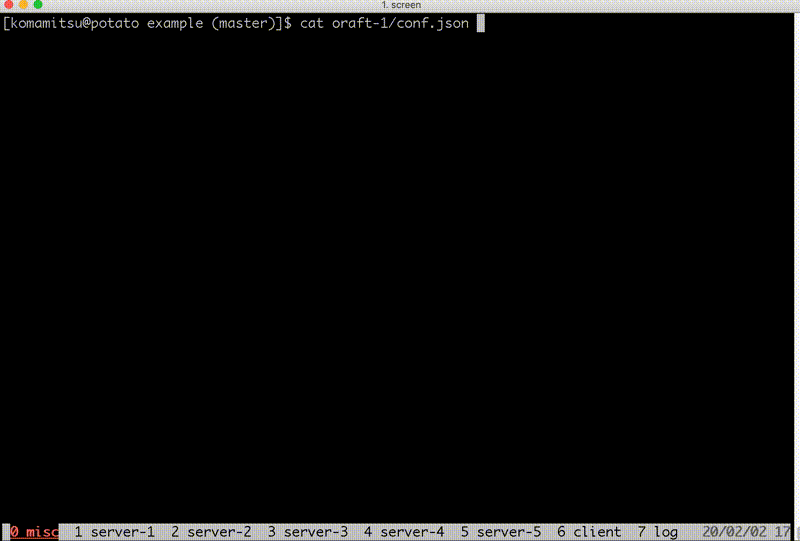Library of Raft consensus algorithm implemented in OCaml
- Cluster membership changes
- Log compaction
- OCaml 4.14 or later
- opam
- dune
$ opam install --deps-only --with-test .
$ dune build
$ opam install .
$ dune runtest
This repository has an example Raft application that is a simple KVS as described below. The following command runs 5 KVS servers and a verification tool that sequentially restarts at most 2 servers.
$ smoke_test/run.sh
This repository has an example Raft application that is a simple KVS as described below. The following command runs 5 KVS servers, a verification tool and chaos testing tool in docker containers. The 5 KVS servers will randomly experience pause and network delay.
$ chaos_test/run.sh
{
"node_id": 2,
"nodes": [
{"id": 1, "host": "localhost", "port": 7891, "app_port": 8181},
{"id": 2, "host": "localhost", "port": 7892, "app_port": 8182},
{"id": 3, "host": "localhost", "port": 7893, "app_port": 8183}
],
"log_file": "oraft.log",
"log_level": "INFO",
"state_dir": "state",
"election_timeout_millis": 200,
"heartbeat_interval_millis": 50,
"request_timeout_millis": 100
}
node_id needs to be modified for each node.
The following code is a very simple application that uses ORaft.
let main ~conf_file =
let oraft =
Oraft.start ~conf_file ~apply_log:(fun ~node_id ~log_index ~log_data ->
Printf.printf
"[node_id:%d, log_index:%d] %s\n"
node_id log_index log_data;
flush stdout
)
in
let rec loop () =
let%lwt s = Lwt_io.read_line Lwt_io.stdin in
let%lwt result = oraft.post_command s in
let%lwt _ = Lwt_io.printl (if result then "OK" else "ERR") in
loop ()
in
Lwt.join [ loop (); oraft.process ] |> Lwt_main.run
let () =
let open Command.Let_syntax in
Command.basic ~summary:"Simple example application for ORaft"
[%map_open
let config =
flag "config" (required string) ~doc:"CONFIG Config file path"
in
fun () -> main ~conf_file:config]
|> Command_unix.runSee example-simple project for details.
This repo contains example-kv project that is a simple KVS.
You can execute the project like this:
$ ./example-kv/run_all.sh
5 Raft application processes will start.
And then, you can send a request using curl command or something
$ curl -X POST --data-binary 'SET a hello' http://localhost:8181/command
$ curl -X POST --data-binary 'GET a' http://localhost:8182/command
hello
$ curl -X POST --data-binary 'SET b 42' http://localhost:8183/command
$ curl -X POST --data-binary 'GET b' http://localhost:8184/command
42
$ curl -X POST --data-binary 'INCR b' http://localhost:8185/command
$ curl -X POST --data-binary 'GET b' http://localhost:8181/command
43
This project uses pre-commit to automate code format and so on as much as possible. Please install pre-commit and the git hook script as follows.
$ ls -a .pre-commit-config.yaml
.pre-commit-config.yaml
$ pre-commit install
The code formatter is automatically executed when commiting files. A commit will fail and be formatted by the formatter when any invalid code format is detected. Try to commit the change again.
